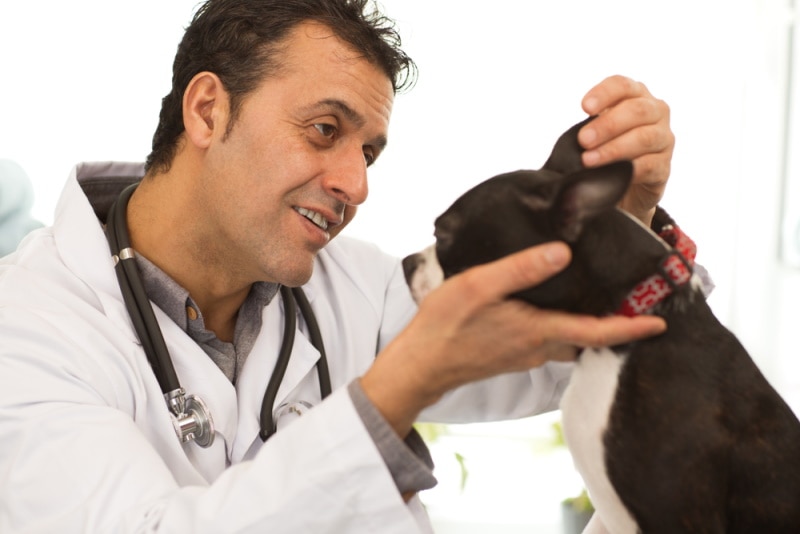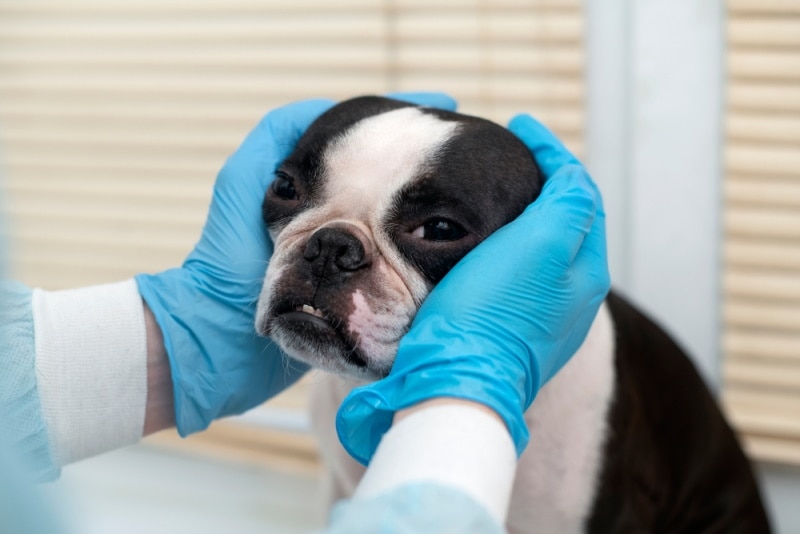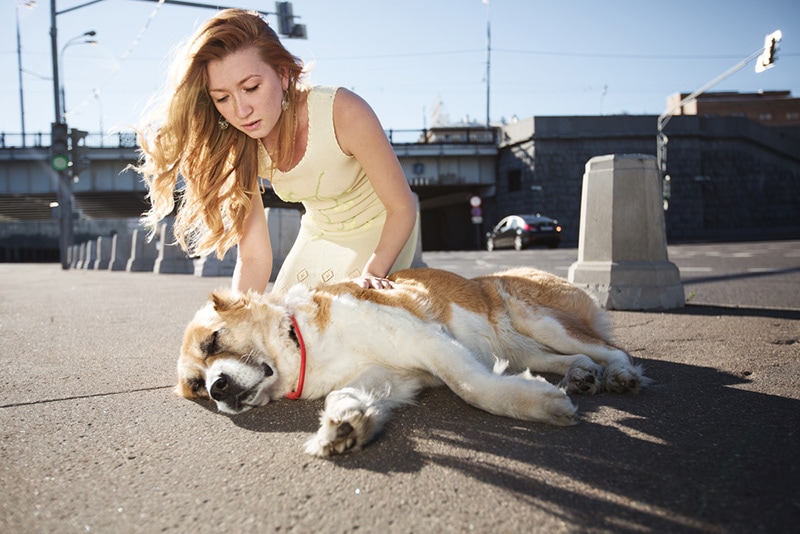Why Do Boston Terriers Shake? 5 Vet-Approved Reasons
Updated on

Caring for your dog means keeping them healthy, happy, and comfortable. So, it can be quite disconcerting when your dog starts to shake.
What exactly is going on here? Is this something that you should be worried about? There are several reasons that Boston Terriers may shake. Some are perfectly normal, but others will merit a visit to your vet.
The 5 Common Reasons Why Boston Terriers Shake
1. They’re Cold
Almost every warm-blooded mammal shivers when they are cold, as the action increases the body’s heat production. When your Boston starts shaking when they are chilly, their body is literally trying to keep them warm.
Since they are small dogs and have short coats with no undercoats, it doesn’t take much for them to start shivering. Dogs like Bostons are on the verge of being too cold when it is 45 degrees Fahrenheit or 7 degrees Celsius. If you must take them outside, ensure that your dog is wearing a coat and boots.
2. They’re Nervous
Stress and anxiety are common causes for dogs to start shaking. It could be during a noisy party or thunderstorm or being introduced to a new situation. Visiting the vet can also bring out the shakes.
You likely already know what causes stress in your dog, and the shaking will typically cease once the stressor is gone.
If you suspect that your Boston shows signs of stress or anxiety more often than the average dog, speak to your vet. They will help you understand why this is happening and create an action plan to tackle the issue.

3. Old Age
Small dogs tend to have longer lifespans than large breeds, but as they grow older, more age-related health conditions will crop up. Senior dogs sometimes shake due to having degenerated joints and generally have a harder time getting around.
This might sound like it is just part of the aging process, but to better help your senior dog, you’ll need to speak to your vet. They can suggest supplements or recommend some home or routine changes that can make a big difference to your dog’s joints and general comfort.
Senior dogs also have a decreased ability to thermoregulate and are susceptible to being cold, so you might need to keep the temperature higher and give them plenty of blankets and sweaters to curl up in.
4. Excitement
When you have a great deal of pent-up energy, you tend to start jiggling, and in the case of Boston Terriers, that translates to excited shaking. It could occur before a meal or during play, or even when you get home from work. If your dog seems particularly excited, it might be time to take them outside and let them run off that energy.

5. Medical Problem
This is when you should take shaking quite seriously. Many of the medical conditions that can cause a dog to shake need immediate veterinary attention.
Medical Conditions That Can Cause Shaking
Poisoning
When a dog ingests something toxic, tremors are one of the possible signs.
- Unusual behavior
- Generalized illness and sleepiness
- Vomiting
- Diarrhea
- Nausea
- Drooling
- Agitation
- Extreme sedation
- Twitching
- Seizures
- Coma
- Death
This is an emergency situation, so you must act quickly and take your dog to the closest emergency clinic. In general, keep foods that are toxic for dogs away from them, including chocolate, xylitol, grapes and raisins, onions, garlic, and alcohol.

Seizures
Seizures can cause tremors. Partial seizures may cause your dog to shake or twitch a specific part of their body, like their leg or face. On the other hand, generalized seizures cause more severe and whole-body involuntary movements, along with losing consciousness and toileting unconsciously. If you suspect that your Boston might be having seizure, try to record it, so you can show it to your vet or veterinary neurologist.
Shaker Syndrome
Shaker syndrome, also called generalized tremor syndrome, is typically due to a mild central nervous system disease, but otherwise, the cause is unknown. It tends to affect white-coated dogs the most, but a dog with any coat color can be afflicted.
Young and middle-aged dogs also tend to be most affected by this syndrome. As you can tell by the name, it causes body tremors but is commonly mistaken for anxiety or hypothermia.
Distemper
Fortunately, distemper isn’t that common because it’s routinely taken care of by core vaccinations. It’s a highly contagious disease that often proves fatal and can be passed on to other dogs, as well as coyotes, wolves, raccoons, foxes, etc.
- Coughing
- Yellow-green eye discharge
- Nasal discharge
- Sneezing
- Vomiting
- Diarrhea
- Depression
- Lack of appetite
Tremors or shaking can occur when the disease has progressed,
- Chewing motions
- Seizures
- Partial or complete paralysis
- Crusty foot pads and nose
- Pneumonia
- Severe diarrhea and vomiting
- Death
High Fever
A high fever or hyperthermia can lead to shaking, which is a life-threatening emergency. Dogs with temperatures above 103°F are considered hyperthermic, and if they are not treated, it can lead to multiple organ failure.
A dog suspected of being hyperthermic must be brought to a veterinarian immediately. You should begin to cool down your dog while on your way to the vet. Be sure to use lukewarm water, not cold, which can delay cooling off by causing constriction of the blood vessels.
You can use the air vents in your car to help cool off the dog and offer them small amounts of cool (not cold) water to drink. You can ask the vet for further instructions when you call.
How Can You Stop the Shaking?

This ultimately depends on what is causing the shaking to begin with.
- Coats and sweaters: If you live somewhere cold, you will need to invest in coats and sweaters for your Boston Terrier, as these will help when your dog is feeling chilly. Ensure that you have cozy, warm dog beds in the house, and keep them away from any drafty windows.
- Dog behaviorist: If your Boston Terrier seems to have extreme anxiety issues, you might need to speak to your vet and consider an animal behaviorist. They can provide you with various methods to help your dog better cope with stress.
- Thundershirt: This might help your dog when something scary is going on, like fireworks and thunderstorms. It puts pressure on the dog’s body, which helps keep them calmer. You can also ask an animal behaviorist for advice on this.
-
Call the vet: If your dog is shaking, is behaving differently, and seems to be in distress in any way, you need to speak to the vet.
Conclusion
Most of the time, a Boston Terrier’s shaking can be quite innocent and is no cause for alarm. You can usually tell what is going on with your dog at the time.
But if there’s no explainable reason for it, and your dog starts shaking and they haven’t done so before, you should speak to your vet sooner rather than later.
Try to record a video while it’s occurring, as it will give your vet a better idea of what is happening with your dog.
Featured Image Credit: skeeze, Pixabay















